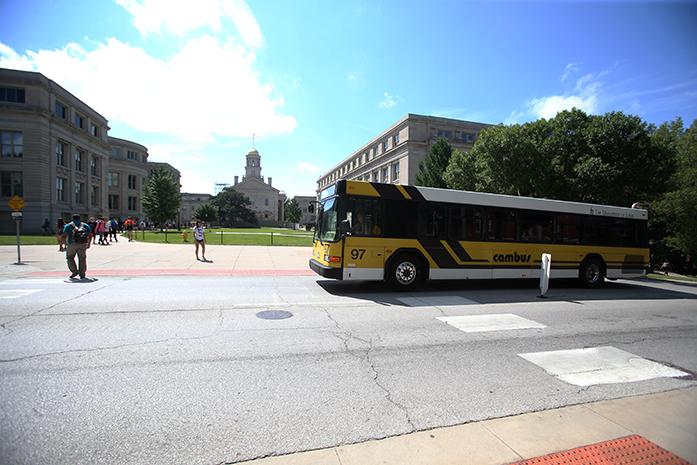Cambus increases wages after staff numbers drop in the summer.
By Madeleine Neal
It’s Monday morning on the West Side of campus, and students are scrambling to make it to their 8 a.m. classes. What do they do?
Take a Cambus.
In a statement released on its website, Cambus said, “It is [the] goal to continually improve the safety and quality of our service,” adding that it provides approximately “4 million rides per year.”
With a high demand, Cambus raised its starting wage to $13 an hour. McClatchey said he knows driving a large vehicle in Iowa City can be intimidating.
“We recognize we need to be one of the better paying jobs on campus,” he said. “It has people give [Cambus] that second look.”
Cambus manager Brian McClatchey said learning to drive a Cambus is a significant skill to acquire.
“Our workers are a special group of people; it’s a unique job,” he said. “We dealt with very significant road construction this summer — the [drivers] adjusted well.”
He noted that as drivers changed shifts, they were sure to warn their colleagues about route problems.
Along with the challenge of numerous road construction projects around the city, prospective drivers are required to obtain a commercial driver’s license.
UI sophomore Jacob Guenther, who has worked at Cambus for six months, appreciates the effect of the higher wage.
“I definitely think [the wage increase] does [help],” he said. “We’ve got a lot of new recruits.”
New recruits, McClatchey said, were not as frequent during the summer, and Cambus experienced a drop in employment from the previous months. He did not, however, attribute the drop to construction.
“Over the summer, we struggled because fewer people were here,” he said. “A lot of the people still here already had summer jobs lined up.”
Although McClatchey admitted it might seem daunting at first glance, he said that Cambus offers one-on-one training and current employees are an effective resource for new drivers.
He noted that drivers become very accustomed to their assigned routes, and the only non-routed bus, the Bionic Bus, generally requires at least five months of Cambus experience.
Cambus alumna Erica Pleggenkuhle, who graduated from the UI in 2014, said the job affected her in a number of ways.
“I knew a girl who worked for Cambus — it was a job with good flexibility,” she said. “I had two jobs at the time — I could work two- to three-hour shifts.”
McClatchey said the job is very flexible — most shifts are between two and four hours — the earliest clock-in is at around 4 a.m. and the latest around 1 a.m.
When Pleggenkuhle started working with Cambus in 2010, the starting wage was around $10 an hour. In addition, she was able to move up from her driver position to dispatcher and then scheduling supervisor, which she said, caused her to switch her major from health care to business. She met the man she later married at Cambus.
“Aside from my husband, it helped me decide what to do,” she said.
Today, Cambus drivers are still known as a tightly knit group — especially by McClatchey.
“They share a bond because of the nature of the job,” he said.
As summer comes to a close, he said, new drivers are very well-trained.



